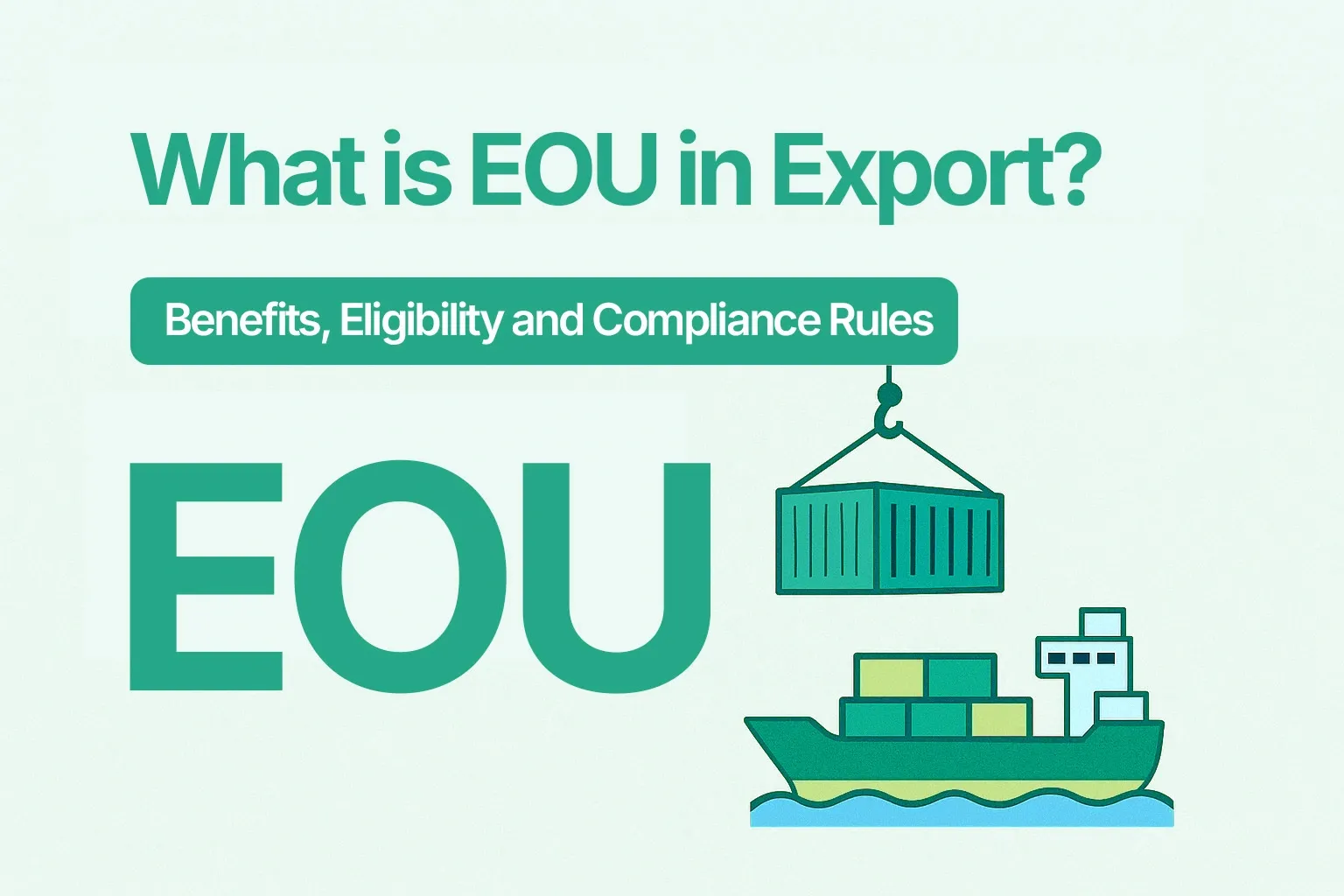What is EOU in Export? Benefits, Eligibility, and Compliance Rules
Understand the meaning of Export Oriented Unit. Learn what EOU is in export, its key benefits, eligibility criteria, and the difference between SEZ and EOU

India has established several schemes to promote exports, and one of the most important among them is the Export Oriented Unit (EOU) scheme. EOUs play a vital role in boosting India’s foreign exchange earnings by producing goods exclusively for export.
In this blog, we’ll break down the EOU full form, EOU meaning, eligibility criteria, benefits, compliance requirements, and how EOUs differ from SEZs.
EOU Full Form and Meaning
The full form of EOU is Export Oriented Unit.
An EOU is a unit established with the primary objective of exporting 100% of its production of goods and services. These units are allowed to operate anywhere in the country (unlike SEZ units that operate in specific zones).
EOU Meaning in Simple Terms
In simple words, an EOU is a business unit set up in India that manufactures goods or provides services only for exports, while enjoying tax benefits, duty exemptions, and easier compliance requirements from the government.
Objectives of the EOU Scheme
The Export Oriented Unit scheme was introduced to:
- Promote India’s export growth
- Earn foreign exchange for the country
- Create employment opportunities
- Encourage use of advanced technology in production
- Provide duty-free access to inputs and raw materials
Benefits of EOU
EOUs enjoy several advantages that make them attractive for exporters:
- Duty-Free Import of Raw Materials and Capital Goods: EOUs can import raw materials, consumables, and machinery without paying customs duty.
- Tax Benefits: Earlier EOUs enjoyed complete income tax exemptions under Section 10B of the Income Tax Act (now withdrawn, but they still get GST benefits and other concessions).
- Reimbursement of Duty on Fuel: Certain EOUs are eligible for reimbursement of excise duty on fuel purchases.
- Exemption from Industrial Licensing: In most cases, EOUs don’t need an industrial license.
- Simplified Procedures: EOUs enjoy faster customs clearance and reduced paperwork.
- Flexibility: Unlike SEZ units, EOUs can be set up anywhere in India.
Eligibility for Setting Up an EOU
Businesses across various sectors can apply for EOU status. Eligibility includes:
- Sectors Allowed: Manufacturing, software development, gems & jewelry, agriculture, biotechnology, textiles, chemicals, etc.
- Export Commitment: Units must commit to exporting their entire production (except a limited percentage allowed in the Domestic Tariff Area (DTA)).
- Approval Authority: The Development Commissioner under the Ministry of Commerce grants approval for EOUs.
- Minimum Investment: Some sectors may require minimum investment thresholds in plant and machinery.
Compliance Rules for EOUs
Operating as an EOU comes with specific compliance requirements:
- Net Foreign Exchange (NFE) Earnings: EOUs must maintain positive NFE, meaning exports should exceed imports over a block period.
- Customs Bonding: EOUs are required to operate from bonded premises under customs supervision.
- Export Obligations: EOUs must export 100% of their production, with limited sales allowed in the Domestic Tariff Area (up to 50% of exports in some cases).
- Regular Reporting: EOUs need to file periodic reports with the Development Commissioner and Customs.
- Adherence to RBI and FEMA Rules: For foreign currency transactions and repatriation of export earnings.
Difference Between SEZ and EOU
While both SEZs (Special Economic Zones) and EOUs are designed to promote exports, they differ in several ways:
Importance of EOUs in Indian Exports
EOUs have played a significant role in sectors like:
- Gems and jewelry
- Textiles and garments
- Electronics and software
- Biotechnology and pharmaceuticals
- Handicrafts and agriculture
By allowing businesses to set up units anywhere in India with duty exemptions, EOUs have contributed significantly to India’s export-led growth.
FAQs on EOU in Export
What is the full form of EOU?
EOU stands for Export Oriented Unit.
What is EOU in export?
An EOU is a unit established in India with the primary objective of producing goods or services exclusively for export.
What is the meaning of EOU in simple terms?
It is a business unit that manufactures goods for export and enjoys tax and duty benefits.
Who approves the setting up of an EOU?
The Development Commissioner under the Ministry of Commerce grants approval for setting up an EOU.
Can an EOU sell products in the domestic market?
Yes, EOUs can sell a limited portion of their goods in the Domestic Tariff Area (DTA), subject to certain conditions.
What is the difference between SEZ and EOU?
EOUs can be set up anywhere in India, while SEZ units must be established within notified SEZ zones. SEZs usually provide more infrastructure support, while EOUs offer flexibility in location.
Are EOUs eligible for tax benefits?
Yes, EOUs enjoy duty-free imports, GST benefits, and other concessions, though full income tax exemptions are no longer available.
Which industries commonly use the EOU scheme?
Textiles, gems & jewelry, IT/software, biotechnology, pharmaceuticals, and handicrafts.
What are the compliance requirements of an EOU?
Maintaining positive NFE, customs bonding, regular reporting, and following RBI/FEMA guidelines for forex transactions.
How does an EOU benefit exporters?
By reducing costs through duty exemptions, simplifying compliance, and providing global market access.